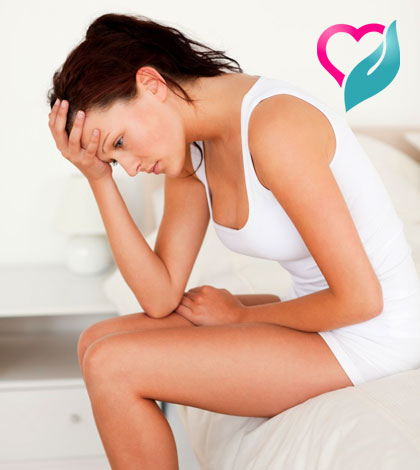The premenstrual syndrome (PMS) is a condition in women where certain symptoms occur each month before a period.
Have you ever wondered why PMS is called premenstrual tension? Sometimes, the symptoms can badly affect their quality of life before periods. Many women feel physical or mood changes during these days. These changes start during the second half of the menstrual cycle and may go away one to two days after the menstrual period starts.
Common Symptoms
Many different symptoms have been reported. You may have just one or two symptoms, or have several.
Psychological symptoms include tension, irritability, tiredness, feelings of aggression or anger, low mood, anxiety, loss of confidence, feeling emotional. You may have a change in your sleep pattern, in sexual feelings and in appetite. Relationships may become strained because of these symptoms.
Physical symptoms include breast swelling and/or pain, abdominal bloating, swelling of the feet or hands, weight gain, an increase in headaches. If you have epilepsy, asthma, migraine or cold sores, you may find that these conditions become worse before a period.
Who Gets It
PMS most commonly affects women aged 30-40 years. However, it can affect you at any age, even if you are less than 20 years old. Most women can tell that a period is due by the way they feel both physically and mentally. For most, the symptoms are mild and not troublesome.
Natural Remedies
Exercise
Though exercise may be the last thing you want to do when you are in PMS, it is actually quite effective in helping reduce PMS symptoms. Aerobic or cardio exercise reduces stress, boosts circulation, releases endorphins, and has been shown to reduce the uncomfortable symptoms of PMS.
Sleep
Get plenty of sleep. Listen to your body. That period-related fatigue means you need your rest. That could mean going to bed early, if you work a regular 9-5 job or sneaking in a nap, if your schedule is more flexible.
Relaxation
Breathing exercises, meditation, aromatherapy, and yoga are some natural ways to reduce stress and promote relaxation. Many women feel more assertive and attuned to their needs in the weeks before menses. This can be used constructively by allowing for personal time to relax, expressing emotions, and giving priority to your needs and what nourishes you.
Diet Control
You need to avoid or reduce certain foods to encourage hormonal balance. Reduce intake of saturated fats particularly from meat and processed and refined foods such as biscuits, cakes, pre-prepared frozen meals. Completely eliminate hydrogenated fats, often found in margarine and other processed foods. Avoid refined sugar and use small amounts of natural sweeteners such as honey. Cut down on your consumption of salt and use sea salt instead of table salt, which is more refined. Reduce alcohol intake.
You may eat certain foods to encourage hormonal balance. Eat whole grains rather than white pasta, rice and bread. Whole grains contain many more nutrients than their refined versions, they also take the body longer to convert into sugar providing a slow release of energy rather than a quick release of sugar into the system.
Eat a wide variety of legumes, including soya but take care not to rely on it too heavily. Chickpeas, lentils, mung beans, aduki beans etc all provide phyto-oestrogens which help to balance the hormones, as do seeds, grains and some herbs.
Eat plenty of vegetables and some fruit. We should be aiming to have at least five portions of vegetables and fruits per day. Eat fruit at room temperature to help digestion. Produce grown organically is generally tastier, higher in vitamin and mineral content and is not sprayed with synthetic pesticides.
Include oil-rich foods such as oily fish, ground linseed, nuts, pumpkin seeds and fresh cold pressed oils olive, hemp seed, pumpkin seed. To ensure adequate intake of Omega 3 essential fatty acids, take a supplement or use linseed (also known as flaxseed) oil to pour over vegetables and salads.
Supplements
Calcium – Consuming 1,200 milligrams of dietary and supplemental calcium daily, such as chewable calcium carbonate (Tums, Rolaids, others), may reduce the physical and psychological symptoms of PMS.
Magnesium – Taking 400 mg of supplemental magnesium daily may help to reduce fluid retention, breast tenderness and bloating in women with premenstrual syndrome.
Vitamin B-6 – A daily dose of 50 to 100 mg of vitamin B-6 may help some women with troublesome PMS symptoms.
Vitamin E – This vitamin, taken in 400 international units daily, may ease PMS symptoms by reducing the production of prostaglandins, hormone-like substances that cause cramps and breast tenderness.
Iron – Because of the loss of blood during menstruation, women can get tired and even anemic if their iron intake is too low. To keep your energy up all month long, be sure to get enough iron in your diet. But do not overdo it with supplements because too much iron can lead to constipation and toxicity. If you are exhausted, talk to your doctor about testing you for anemia.
Image courtesy: levelht.com , womenshealthmag.com




























